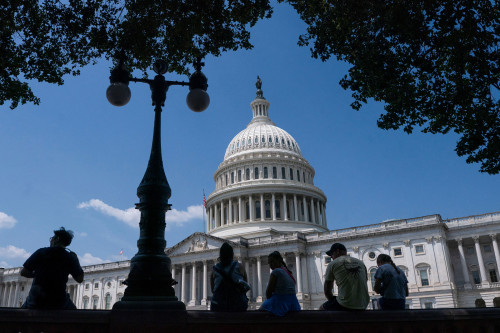(Reuters) -The Republican-controlled U.S. Senate passed President Donald Trump’s sweeping tax-cut and spending bill termed the “big, beautiful bill” on Tuesday.
The measure, Trump’s top legislative goal, passed in a 51-50 vote, after Vice President JD Vance cast the tiebreaking vote.
The megabill would extend the 2017 tax cuts that were Trump’s main legislative achievement during his first term as president, cut other taxes and boost spending on the military and border security.
The Congressional Budget Office estimates it will add about $800 billion more to the national debt than the House of Representatives version. The bill now returns to the House for approval.
The reaction of U.S. stocks, treasuries and the dollar has been fairly muted.
QUOTES:
SCOTT WREN, SENIOR GLOBAL MARKET STRATEGIST, WELLS FARGO INVESTMENT INSTITUTE, ST. LOUIS, MISSOURI:
“The bond market is focused on growth right now, I think, and slowing growth. It’s way more focused on that than some temporary inflationary bump, relative to what’s probably going to happen over the longer term, which is lower inflation. Then also it’s not really thinking much about how much debt we have to sell relative to what the demand, particularly foreign demand, is going to be.”
“Stocks aren’t cheap and they’re extended in some of these sectors and that’s not to say they can’t go higher, but for us, we’re not jumping in here with a bunch of new money.”
CAMPE GOODMAN, FIXED INCOME PORTFOLIO MANAGER, WELLINGTON MANAGEMENT COMPANY, BOSTON:
“I feel caught between my shorter-term sense that hiring is slowing and my longer-term concerns that the deficits we are creating over the next five, 10 years are really large … Is the market still too complacent about what these deficits mean long-term? Yes, and longer term we ought to expect more premium in the long end.”
“Longer-term this is a bad backdrop and it’s something any bond investor has to feel nervous about.”
MAX GOKHMAN, DEPUTY CHIEF INVESTMENT OFFICER, FRANKLIN TEMPLETON INVESTMENT SOLUTIONS, SAN MATEO, CALIFORNIA:
“The impact of this bill on the real economy is going to fall far short of the negative impact of debt issuance that it comes with.”
MICHAEL ARONE, CHIEF INVESTMENT STRATEGIST, STATE STREET INVESTMENT MANAGEMENT, BOSTON:
“Investors will keep a careful eye on the negotiations from the beach this holiday shortened week. But they know the real deadline for passing the bill isn’t until the U.S. Treasury exhausts its ability to meet all of the government’s financial obligations, the so-called X date, later this summer. Until then investors will largely shrug off the messy legislative process. Not surprisingly, 10-year Treasury yields, and gold are higher today while the U.S. dollar is lower.”
RICK MECKLER, PARTNER, CHERRY LANE INVESTMENTS, NEW VERNON, NEW JERSEY:
“I think it’s going to create some problems for the fixed income market as we continue to spend no matter which party is in power, and, ultimately, that’s a negative for the stock market. But the reaction from investors in the short term is just that it’s pro economic development, and they’re not as worried about inflation, and they continue to buy stocks.
“It seems like investors have been very accepting of that risk. Clearly we keep increasing the deficit and longer-term investors have to be concerned about that.”
ROBERT PHIPPS, DIRECTOR, PER STIRLING, AUSTIN, TEXAS:
“The market assumed it was ultimately going to happen. It’s got to go to reconciliation now and there are very large differences between the Senate and the House version. The House tends to have the Freedom Caucus, which is the deficit Hawks. The Senate version actually adds a lot to the deficit, and they’re using an accounting trick to make it look like it doesn’t.”
“The House will ultimately pass a bill because they’ll have to because we have the debt ceiling we’re going to bump up against … I’m hoping that more reasonable heads will prevail and that they come up with something that’s not so onerous to the outlook for the deficit and the U.S. debt load … this is a very potentially damaging bill because of what it does to the deficit and the debt.”
(Reporting by Alden Bentley, Sinead Carew, Svea Herbst-Bayliss, Caroline Valetkevitch and Davide Barbuscia; Editing by Alistair Bell)


